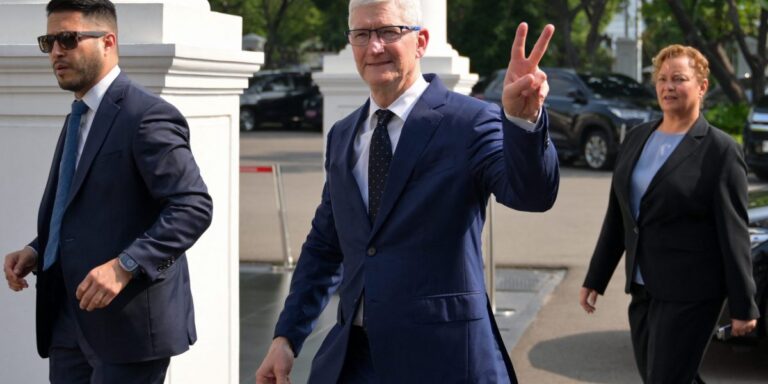Apple CEO Tim Cook is on the hunt for new places that can make Apple products. Just a few days ago, Apple pledged to increase investment in Vietnam, already a manufacturing hub for its products. Cook then flew further south to Indonesia—and said Wednesday that he’s ready to “look at” the country’s manufacturing sector.
After meeting Indonesia’s president, Joko Widodo, commonly referred to as Jokowi, Cook said that Apple will consider investing in an Indonesia-based supply chain, citing the president’s “desire to see manufacturing in the country.”
“The investment ability in Indonesia is endless. There’s a lot of great places to invest, and we’re investing,” Cook told reporters on Wednesday, without going into specifics.
Neither Apple nor its suppliers manufacture products in Indonesia. Apple also does not operate a store in the country.
Yet the company manages several developer academies to integrate Indonesian developers into the iOS ecosystem. On Wednesday, Apple said it would open its fourth academy on the island of Bali.
An Indonesian minister later added that the government asked the iPhone maker to open two more centers, including one in the country’s new capital on the island of Borneo, named Nusantara.
Indonesia requires that smartphones sold in the country are made up of at least 35% local components by value; Apple’s phones satisfy the quota as a result of the company’s investment in local software development.
Jokowi, who will leave office later this year, tried to encourage investment in higher-value manufacturing during his tenure.
In particular, he tried to leverage the country’s large reserves of nickel, a key material used in stainless steel and electric batteries. Indonesia banned the export of raw nickel ore in early 2020, spurring Chinese and Korean refiners to invest in local refining capacity.
Chinese EV giant BYD will also invest $1.3 billion in an Indonesian factory, government officials said earlier this year.
What are Apple’s plans for Vietnam?
Cook’s Indonesia stopover follows a two-day visit to Vietnam, already a manufacturing hub for Apple and its suppliers.
During his trip, Apple pledged to increase its spending on Vietnam-based suppliers. The company said it has spent $15.7 billion on the country’s supply chain since 2019, creating about 200,000 jobs.
Apple and its suppliers already produce iPhones, iPads, Apple Watches, and MacBooks in the country. The company relies on 25 suppliers in Vietnam, up from 21 in 2020, according to Reuters.
China is Apple’s largest manufacturing hub, but the company is diversifying its supply chains following significant COVID-era disruptions to its China-based manufacturing. Lockdowns in Zhengzhou, home to Apple supplier Foxconn’s most important iPhone plant, significantly disrupted Apple’s 2022 smartphone production ahead of the holiday season.
In addition to Vietnam, Apple is expanding production in India. The company made 14% of its iPhones in the South Asian country last fiscal year, up from 7% during the preceding fiscal year, Bloomberg reported last week.
Apple is also facing a slump in China sales owing to renewed competition from domestic brands. Chinese competition helped knock Apple from its perch as the world’s top smartphone seller in the first quarter of 2024, according to a report from research firm IDC.
CEO Daily provides key context for the news leaders need to know from across the world of business. Every weekday morning, more than 125,000 readers trust CEO Daily for insights about–and from inside–the C-suite. Subscribe Now.

